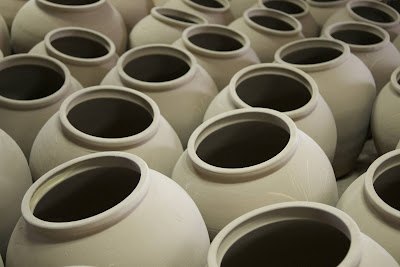In the tiny village of An-nae, Choi Kil-Dong has an onggi factory. He comes out to meet us with a cheery smile and shows us around. There are maybe six people working for him; mixing and cutting clay, filling moulds, finishing, stacking and wheeling rickety old carts about the place. They all share the same look; a little wizened, but ageless and graceful. They do everything slowly, economically, and by hand.
Hand finishing onggi
Korean society holds artisans in relatively low esteem. There is no recognition for traditional skills like these, handed down through generations and so central to their culture. These guys hide away in their corners, diligently crafting the most wonderful creations. They are artists, and we tell them so. But it won't help. Demand is waning and one day, in ten years maybe, Dong thinks he might not have a business any more.
Lids, drying in the sun
Onggi, dried and ready to be fired
The clay is a mixture of red earth from the nearby hills, charcoal and water; nothing more. The jars it creates, though impermeable, have a unique breathability perfect for fermentation. They also inhibit dangerous bacteria, and have been proven to actually purify water left in them. Mr Dong, a devout Catholic with a holographic Jesus/Mary on the wall of his lounge, believes they are a miracle.
They are round, like ying and yang. The world is round. The sun is round, the moon is round. We are round. Everything man makes is square - fridge, TV, book. One day, maybe I will make square onggi, just to see if they still work
He wears the smile of a man who knows they won't.




I share his love of the round shape... But really enjoy his comparison to how much of what is man made is square... I never thought of that, but it's a really interesting observation.
ReplyDelete